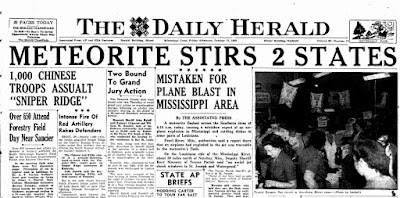1952 was the year that put flying saucers on the map, but it was so busy that many reports were never investigated by Project Blue Book. The morning of October 17, 1952, a brilliant flash was seen in the sky in parts of Louisiana and Mississippi, and reports from witnesses came in of a mysterious fireball zig-zagging in the air, or an exploding airplane, or an attacking flying saucer.
The event made news, especially in the two states where it had been seen. From the Mississippi coverage:
The Daily Herald (Biloxi, MS), Oct. 17, 1952
On the Louisiana side of the Mississippi River, about 30 miles north of Natchez. Miss.. Deputy Sheriff Rosy Massony of Tensas Parish said "an awful jar shook windows in St. Joseph and Waterproof." The Tensas Parish sheriff's office is in St. Joseph. "Some of our boys told us pots and pans were rattled in kitchen shelves" Massony said. Massony said others who said they saw the flash were two Negroes driving an early morning grocery truck near St. Joseph. They said they stopped the truck when it looked as if the fireball was heading toward them. Massony said they ducked under the dashboard. In New Orleans an airport porter declared "the flying saucer" chased him to the sea wall.
Meanwhile, the meteorite had the spotlight. Radio Station KALB at Alexandria. La., said it had received reports from over Louisiana of an explosion or flash. One person told the station that he heard an explosion that "sounded like the blowing of a safe," and another said there was a "blue vapor trail" at about 14,000 feet. Sounded a bit like flying saucer stuff!
Coverage of the story varied, depending on the information each paper had at the time the story went to press or the editor's appetite for sensationalism.
 |
| October 17, 1952 The Monroe News-Star from Monroe, Louisiana |
The earliest story to get a good handle of the facts was from Alexandria, Louisiana.
 |
| The Louisiana Alexandria Daily Town Talk, October 17, 1952 - Page 1 |
Identify Mystery Light
Meteorite In Southern Sky Stirs Frenzy
Meteorite Excites Dixieland. A brilliant flash appeared in southern skies early today and authorities, here probably was caused by a meteorite. The bright light was seen by witnesses as far away as Shreveport, in the north- west, of Louisiana; and another report came from an air-line pilot who said he saw the flash while flying 50 miles north of Mobile, Ala. Buildings were reported lightly shaken at Natchez and Summitt, Miss. A long-distance operator in Jackson, called to ask if there were any reports of an explosion said the aerial explosion occurred about 4:10 a.m., approximately the same time buildings trembled in the two Mississippi cities. Persons saw the flash In Louisiana felt no concussion, however, and police said no sound was reported.
Dr. Joseph F. Thompson, associate professor of astronomy and mathematics at Tulane University, said "the phenomenon probably caused by a meteorite" with "explosive tendencies." Dr. Thompson explained "burn up when they enter, the atmosphere and terrific heat stirs up inside the meteor core, When these gases certain temperature, their pressure can be enough to explode the meteor, causing terrific brightness."
Local descriptions of the fireball varied from "it sounded like someone blowing a safe" to a report from Overton street where a woman reported she thought "the moon done slipped." C. Dupuy, of Poland, said a "light of great intensity" flashed over the area about 15 miles high. He said the light was so bright "I could have picked up a pin off the floor." Mrs. W. T. Franklin of Alexandria said she saw the trail of light near an explosion. The blast was followed by smoke-like colored rings, she reported. Other residents in the area reported seeing the flash and "colored smoke rings" in the sky after the fireball disappeared. Mr. and Mrs. Roy Caubarreaux, of Cocoville, between Marksville and Mansura, said they were awakened by the bright light.
Epilogue
Once the facts were in, the excitement died down, but the story had a last gasp, as a treasure hunt for meteorites.
 |
| The Greenville, MS Delta Democrat-Times, Oct. 22, 1952 |
As with so many of the most interesting UFO cases featured here at The Saucers That Time Forgot, Project Blue Book has no file on this incident.






























